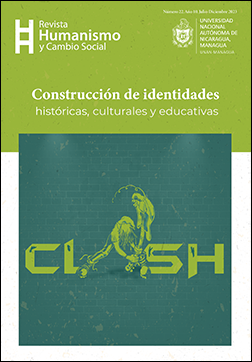Approach to the evolution in knowledge management in the digital era: A reflection on the future of librarianship in Nicaragua
DOI:
https://doi.org/10.5377/hcs.v21i21.17656Keywords:
Information management, technology, artificial intelligence, hybrid library, researchAbstract
The main objective of this work is to engage with various authors and the academic community regarding the impact of new technologies on knowledge management and the threats these pose to the academic sphere, considering the recent explosion of artificial intelligences. It is widely recognized that technology has displaced hundreds of workers from their jobs worldwide; hence, this essay aims to problematize the future of librarians, both internationally and in Nicaragua. The findings of this reflection indicate that, in our country’s context, the role of information managers has been strengthening as Information and Communication Technologies progress. Moreover, our universities have a clear policy advocating for the continuous training and updating of human resources in this field, enhancing this professional profile through undergraduate and postgraduate education programs. One of the significant strengths in knowledge management within our universities, particularly at UNAN-Managua, has been the adoption of the concept of the hybrid library, bridging the analog and digital realms. This approach has facilitated the creation of an integrated institutional management information system enabling effective information handling through digital platforms such as websites, institutional repositories, subscribed databases, electronic newsletters, and specialized search engines. In this regard, it is evident that our institution’s authorities have responded with great certainty to these challenges.
Downloads
265
References
Ansede, M. (3 de junio de 2023) Un científico que publica un artículo cada dos días muestra el lado oscuro de la ciencia. El País. https://elpais.com/ciencia/2023-06-03/uncientifico-que-publica-un-estudio-cada-dos-dias-muestra-el-lado-mas-oscuro-dela-ciencia.html
Arévalo, J. y Quinde, M. (2023) ChatGPT: La creación automática de contenidos con Inteligencia Artificial y su impacto en la comunicación académica y educativa. Revista Desiderata. Nº. 22. 136-142 https://dialnet.unirioja.es/servlet/articulo?codigo=8965142
Asociación Andaluza de Bibliotecarios (2007) ¿Cómo se perciben las bibliotecas y los recursos de información? Vol. 22, Núm. 86-87, enero-junio, pp. 159-169 https://www.redalyc.org/pdf/353/35312964012.pdf
Duelo-Arriola, J. y Soffritti, M. (2019) Libro de papel vs libro digital: pasado, presente y futuro. Universidad Pontificia de Madrid. https://repositorio.comillas.edu/xmlui/bitstream/handle/11531/27707/TFG%20Duelo%20Arriola%2C%20Juan.pdf?sequence=1
Franco, G. (22 de noviembre de 2022) ¿Cuándo desaparecerá el último lector del diario impreso? La República. https://www.larepublica.co/empresas/cuando-desaparecerael-ultimo-lector-del-diario-impreso-3493210
García López, G. (2007) Evolución histórica de los conceptos de biblioteca pública, sistema de bibliotecas y política bibliotecaria. Revista Códice Vol. 3, Nº 2: 9-20
Gonzalvo, M. (2021) El impacto de la automatización y las nuevas tecnologías en la evolución del empleo. Universidad Pontificia de Madrid. https://repositorio.comillas.edu/xmlui/bitstream/handle/11531/46844/TFG-Grua%20Gonzalvo%20Maria.pdf?sequence=2
Gutiérrez, E. (2009) Leer digital: la lectura en el entorno de las nuevas tecnologías de la información y la comunicación. Signo y Pensamiento, vol. XXVIII, núm. 54, enero-junio, pp. 144-163
Marshall McLuhan, el “profeta de la era digital” que predijo internet 20 años antes de que se inventara. (21 de julio de 2017). BBC Mundo. https://www.bbc.com/mundo/noticias-40681655
Ocampo, M. (2018) Inteligencia Artificial. INYTU. No 012. https://www.foroconsultivo.org.mx/INCyTU/documentos/Completa/INCYTU_18-012.pdf
Real Academia Española (2022): Diccionario de la lengua española, 23.ª ed., [versión 23.6 en línea]. https://dle.rae.es
Rodríguez Herrera, A. (2016) Centro de difusión de las humanidades (CDIHUM) en su primer aniversario de apertura. Informe Técnico. UNAN-Managua.
Romero López, J. Pinos Romero, K. Fernández, E. y Arteaga Y. (2022) Nativos digitales y modelos de aprendizaje. Polo del conocimiento. Vol. 7. Ed. 68. Núm. 3. 653-668 Doi:10.23857/pc.v7i3.3754
UNAN-Managua (s.f.) Gestión de la Información. Facultad de Humanidades y Ciencias Jurídicas. https://www.unan.edu.ni/index.php/oferta-educativa/humanidades-yciencias-juridicas.odp
Weller, S. Campbell, S. (2019) Cambio tecnológico y empleo: una perspectiva latinoamericana. Riesgos de la sustitución tecnológica del trabajo humano y desafíos de la generación de nuevos puestos de trabajo. Serie Macroeconomía del Desarrollo, N° 201. CEPAL.
Downloads
Published
How to Cite
Issue
Section
License
Copyright (c) 2023 Universidad Nacional Autónoma de Nicaragua, UNAN-Managua

This work is licensed under a Creative Commons Attribution-NonCommercial-ShareAlike 4.0 International License.




